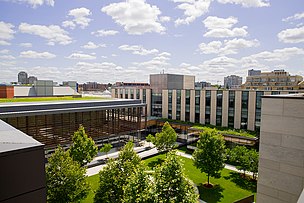CIGI Campus
The CIGI Campus, located in Waterloo, Ontario, is a hub of academic study and policy-based research in global governance and international affairs. Currently, the campus contains its namesake Centre for International Governance Innovation (CIGI), a global think tank previously housed in the former Seagram Museum, and the Balsillie School of International Affairs (BSIA).
 | |
| Type | Hub for research and study of international affairs |
|---|---|
| Headquarters | 67 Erb Street West |
| Location | |
Parent organization | The Centre for International Governance Innovation |
| Affiliations | Balsillie School of International Affairs |
| Website | www.cigicampus.org |
History
In 2009, CIGI announced plans to house the BSIA within a "CIGI Campus" that would be built alongside its headquarters in Waterloo. The resulting $68 million complex received federal and provincial funding totalling $50 million through the Knowledge Infrastructure Program and Ontario's 2009 Budget. The City of Waterloo donated the land for the campus through a 99-year lease.
Toronto-based Kuwabara Payne McKenna Blumberg Architects was selected to design the CIGI Campus building in a classic Oxbridge style, complete with an inner courtyard and bell tower. Construction began in 2009 and substantially concluded in late 2011.[1]
Features
Within the CIGI Campus courtyard is a public art installation crafted by Richard Fleischner. The art piece highlights significant moments of progress in international governance, with copper markers located on an unseen world map.[2]
The building also incorporates environmentally friendly green roofs, operable windows, energy-efficient in-slab cooling and heating systems, and an underground cistern to collect grey water for landscape irrigation. The building was constructed using a BubbleDeck system that reduces structural concrete usage, and as a whole, achieves a 50-percent energy reduction beyond the requirements of the National Building Code.

The campus also houses the CIGI Auditorium, a 250-seat theatre-style space for public lectures and events.
Occupants
The CIGI Campus is home to academic and research programs that are partnerships between CIGI and other institutions. The BSIA, established in 2007 in a three-way partnership among the University of Waterloo, Wilfrid Laurier University and CIGI, was the first occupant of the campus in fall 2011. The school comprises roughly 60 percent of the campus building. Additional occupants on the campus include: The International Migration Research Centre (IMRC), the Japan Futures Initiative (JFI), and the Centre for Sustainable Food Systems.[3] The campus is also home to the Centre for International Governance Innovation's International Law Research Program, announced in November 2013.[4]
References
- "Archived copy". Archived from the original on 2012-04-03. Retrieved 2011-11-14.CS1 maint: archived copy as title (link)
- "Public Art at the CIGI Campus". Centre for International Governance Innovation. Retrieved 2017-11-24.
- "CIGI Campus Occupants".
- "CIGI launches international law program with search for director".
External links
- CIGI Campus Website
- CIGI's Official Website
- Balsillie School of International Affairs
- CIGI Campus Flickr Group